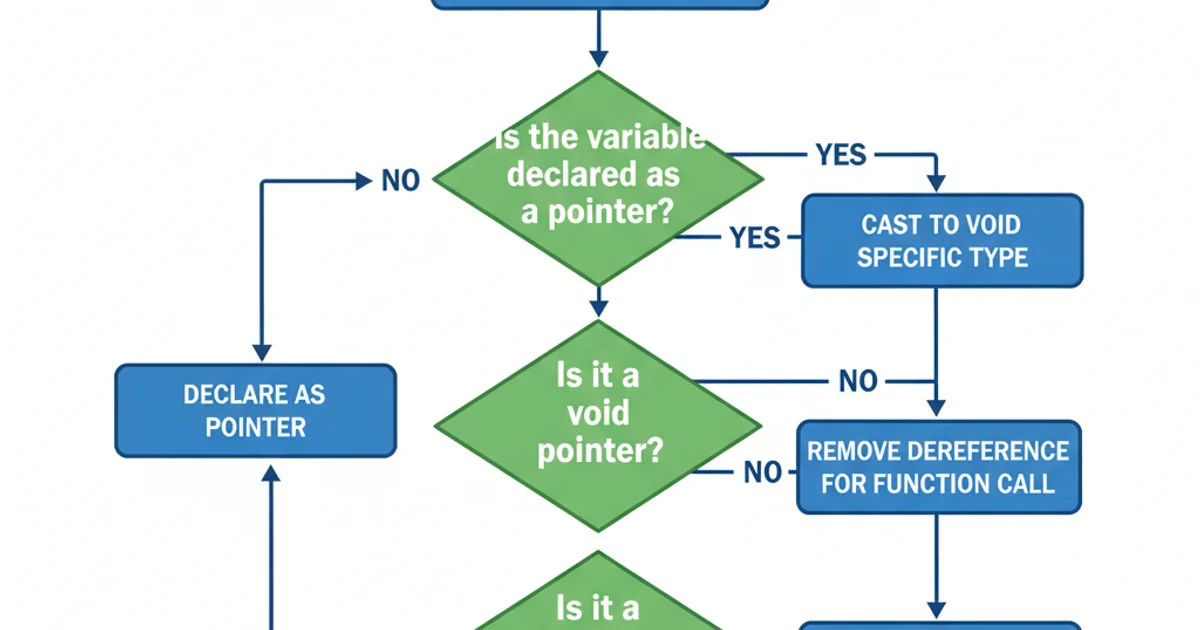Expression must have a pointer to object type in C
Categories:
Understanding 'Expression must have a pointer to object type' in C

This article demystifies the common C compiler error 'expression must have a pointer to object type', explaining its causes and providing practical solutions for correct pointer usage.
The C programming language, renowned for its power and low-level memory access, often presents developers with cryptic error messages. One such common error is 'expression must have a pointer to object type'. This message typically arises when you attempt to dereference a variable that the compiler doesn't recognize as a pointer to an object type. Understanding this error is crucial for writing correct and robust C code, especially when dealing with memory management and data structures.
What Does 'Pointer to Object Type' Mean?
In C, an 'object type' refers to any data type that is not a function type or an incomplete type (like void before it's cast). This includes fundamental types (e.g., int, char, float), derived types (e.g., arrays, structures, unions), and enumerated types. A 'pointer to an object type' is a variable that stores the memory address of an instance of one of these object types. When you dereference a pointer using the * operator, the compiler expects that pointer to be pointing to a valid object type so it knows how to interpret the data at that memory location.
Common Causes of the Error
This error usually stems from one of a few common mistakes related to type declarations and pointer usage. Identifying the root cause is the first step to resolving it.

Decision flow for resolving pointer type errors
Cause 1: Attempting to Dereference a Non-Pointer Variable
The most straightforward cause is trying to use the dereference operator (*) on a variable that was not declared as a pointer. The compiler sees a non-pointer type and cannot apply the dereference operation, as it expects a memory address to follow.
int myValue = 10;
// int* ptr = myValue; // This would be a type mismatch error
// Incorrect: Attempting to dereference a non-pointer
// int result = *myValue; // Error: expression must have a pointer to object type
// Correct usage:
int* ptr = &myValue; // 'ptr' is a pointer to an int
int result = *ptr; // Correct: Dereferencing 'ptr' to get the value 10
Incorrect and correct dereferencing of variables
Cause 2: Dereferencing a void* Without Casting
A void* (void pointer) is a generic pointer that can point to any data type. However, because it's generic, the compiler doesn't know the size or type of the data it points to. Therefore, you cannot directly dereference a void*. You must first cast it to a specific object pointer type before dereferencing.
void* genericPtr;
int value = 25;
genericPtr = &value;
// Incorrect: Cannot dereference void* directly
// int retrievedValue = *genericPtr; // Error: expression must have a pointer to object type
// Correct: Cast to an int* before dereferencing
int retrievedValue = *(int*)genericPtr; // Correct
printf("Retrieved value: %d\n", retrievedValue);
Handling void* pointers correctly
Cause 3: Misusing Function Pointers
Function pointers point to functions, not data objects. While you can call a function through a function pointer, you don't 'dereference' it in the same way you would an object pointer to access data. The * operator is often optional when calling a function via a pointer, but attempting to assign its 'dereferenced value' to a non-function type will result in this error.
int add(int a, int b) {
return a + b;
}
int main() {
int (*funcPtr)(int, int) = &add;
// Incorrect: Attempting to dereference a function pointer as an object
// int result = *funcPtr; // Error: expression must have a pointer to object type
// Correct: Calling the function through the pointer
int sum = funcPtr(5, 3); // Or (*funcPtr)(5, 3);
printf("Sum: %d\n", sum);
return 0;
}
Correct usage of function pointers
Cause 4: Array Name Misinterpretation
In many contexts, an array name decays into a pointer to its first element. However, an array name itself is not a modifiable lvalue and cannot be directly dereferenced in all scenarios as if it were a pointer variable. This is a subtle distinction that can sometimes lead to this error, especially when trying to assign to *arrayName.
int arr[5] = {1, 2, 3, 4, 5};
// Incorrect: 'arr' is an array name, not a pointer variable that can be dereferenced for assignment
// *arr = 10; // This might compile but is generally bad practice or can lead to errors in other contexts
// The error 'expression must have a pointer to object type' is less common here
// but can appear if 'arr' is somehow misinterpreted as a non-pointer type.
// Correct: Accessing array elements
arr[0] = 10; // Accessing the first element
// Correct: Using a pointer to modify the first element
int* ptrToArray = arr;
*ptrToArray = 20;
printf("arr[0]: %d\n", arr[0]); // Will print 20
Array name vs. pointer variable
Resolution Strategies
To resolve the 'expression must have a pointer to object type' error, follow these steps:
1. Verify Variable Declaration
Check if the variable you are trying to dereference (*variable) is indeed declared as a pointer type (e.g., int*, char*, struct MyStruct*). If it's a non-pointer type, remove the * operator or declare it as a pointer if that's your intention.
2. Handle void* Pointers
If the variable is a void*, cast it to the appropriate object pointer type before dereferencing. For example, *(int*)genericPtr.
3. Distinguish Function Pointers
If it's a function pointer, ensure you are calling the function correctly (e.g., funcPtr(args) or (*funcPtr)(args)) and not attempting to dereference it as if it holds data.
4. Review Array Usage
If you're working with arrays, remember that arrayName[index] is the correct way to access elements. If you need a modifiable pointer to an array element, assign &arrayName[0] or arrayName to a pointer variable.
5. Check for Missing Includes or Type Definitions
Sometimes, if a struct or typedef is not properly included or defined before use, the compiler might not recognize its pointer type, leading to this error. Ensure all necessary headers are included.